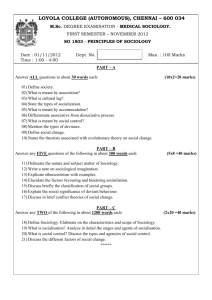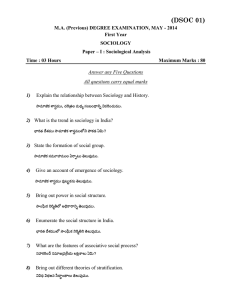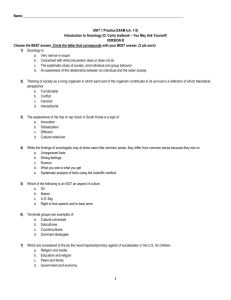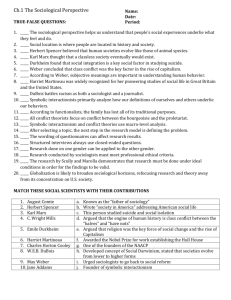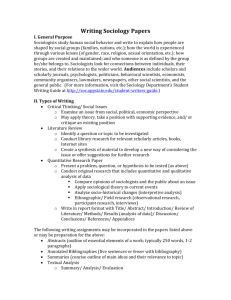Further information on Higher Sociology Specimen Question
advertisement
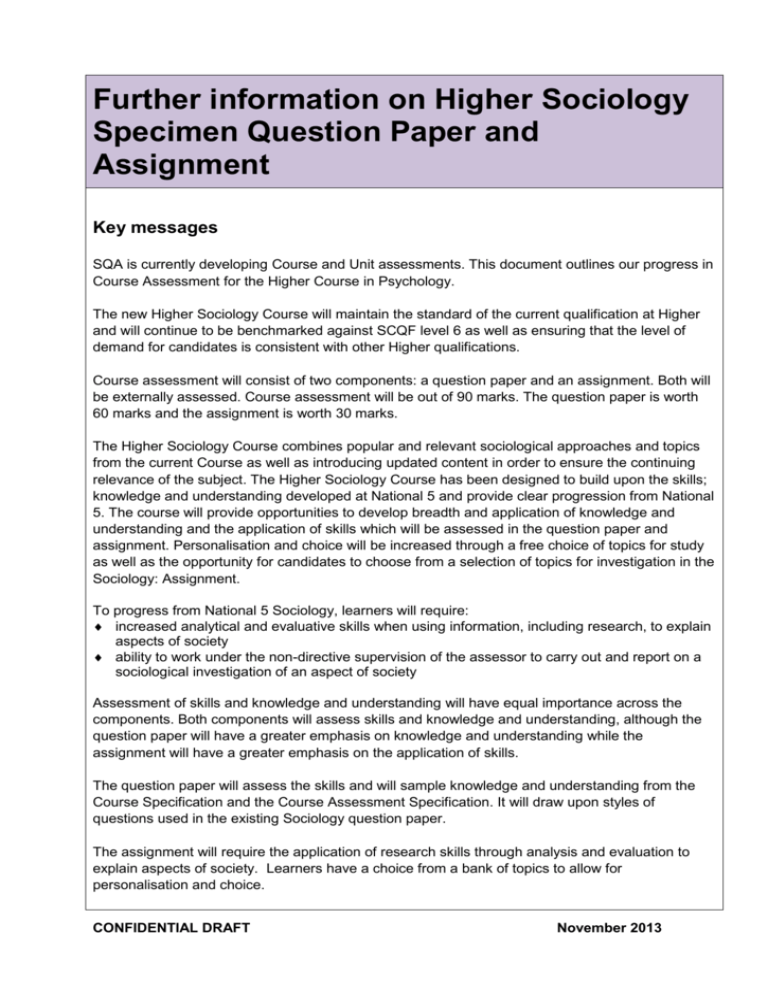
Further information on Higher Sociology Specimen Question Paper and Assignment Key messages SQA is currently developing Course and Unit assessments. This document outlines our progress in Course Assessment for the Higher Course in Psychology. The new Higher Sociology Course will maintain the standard of the current qualification at Higher and will continue to be benchmarked against SCQF level 6 as well as ensuring that the level of demand for candidates is consistent with other Higher qualifications. Course assessment will consist of two components: a question paper and an assignment. Both will be externally assessed. Course assessment will be out of 90 marks. The question paper is worth 60 marks and the assignment is worth 30 marks. The Higher Sociology Course combines popular and relevant sociological approaches and topics from the current Course as well as introducing updated content in order to ensure the continuing relevance of the subject. The Higher Sociology Course has been designed to build upon the skills; knowledge and understanding developed at National 5 and provide clear progression from National 5. The course will provide opportunities to develop breadth and application of knowledge and understanding and the application of skills which will be assessed in the question paper and assignment. Personalisation and choice will be increased through a free choice of topics for study as well as the opportunity for candidates to choose from a selection of topics for investigation in the Sociology: Assignment. To progress from National 5 Sociology, learners will require: increased analytical and evaluative skills when using information, including research, to explain aspects of society ability to work under the non-directive supervision of the assessor to carry out and report on a sociological investigation of an aspect of society Assessment of skills and knowledge and understanding will have equal importance across the components. Both components will assess skills and knowledge and understanding, although the question paper will have a greater emphasis on knowledge and understanding while the assignment will have a greater emphasis on the application of skills. The question paper will assess the skills and will sample knowledge and understanding from the Course Specification and the Course Assessment Specification. It will draw upon styles of questions used in the existing Sociology question paper. The assignment will require the application of research skills through analysis and evaluation to explain aspects of society. Learners have a choice from a bank of topics to allow for personalisation and choice. CONFIDENTIAL DRAFT November 2013 Higher specimen Question Paper (publication by 28 February 2014) The question paper will assess the skills and sample knowledge and understanding from the Course Specification and the Course Assessment Specification. The table below summarises the format of the question papers at National 5 and Higher. National 5 Higher Total marks 50 60 Time One hour 30 minutes One hour 30 minutes Sections 1 section 1 section Number of questions 3 mandatory questions 3 mandatory questions Question paper format/optionality/ choice No optional questions No optional questions Both question papers have a focus on breadth of knowledge and understanding of sociology and the application of this knowledge and understanding to provide sociological explanations of aspects of society. However the question paper component of the Higher Sociology Course Assessment is more demanding than the National 5 question paper. Increased breadth of knowledge and understanding of sociological concepts, theories and research evidence will be required. Candidates will apply this breadth of knowledge and understanding to provide different sociological explanations of aspects of society. Candidates will require skills to analyse and evaluate sociological research methods, theories and research evidence. The breadth of knowledge and understanding required will be drawn from all units of the Course and the application of knowledge and/or skills will relate to a range of social contexts. The Course Assessment Specification sets out requirements for the whole Course in the “Further Mandatory Information” section. The Higher Sociology question paper will give learners an opportunity to demonstrate the following skills, knowledge and understanding: explaining differences between sociological and common-sense explanations of human social behaviour understanding society by explaining sociological perspectives, theories and concepts explaining the sociological significance of relationships amongst individuals, groups and institutions in a changing social world explaining and evaluating research methods used in sociology using sociological theories to analyse and explain human social behaviour using knowledge and understanding to evaluate research and evidence to support explanations This question paper will be set and marked by SQA, and conducted in centres under conditions specified for external examinations by SQA. For the Question Paper, there will be a separate question paper and answer booklet. CONFIDENTIAL DRAFT November 2013 Higher Assignment (publication by 31 March 2014) The assignment will require candidates to apply research skills in the context of a Sociology topic. Learners have a choice of from a bank of topics to allow for personalisation and choice. At Higher, the assignment will give learners an opportunity to demonstrate the following skills, knowledge and understanding: using research skills to find and evaluate sources of information and research studies organising and evaluating information in sociology communicating sociologically-informed views At Higher the Assignment is worth 30 marks. The assignment will have a greater emphasis on the assessment of skills than the question paper. Evidence will be submitted to SQA for external marking. SQA will produce two documents called Assignment: General Assessment Information and Assignment: Assessment Task. Criteria used to allocate marks Mark Allocation Explain differences between sociological and common-sense explanations of human social behaviour. (10 marks) Use research skills and evaluate sources of information, findings and a research study. (10 marks) Communicate sociologically-informed views. (10 marks) CONFIDENTIAL DRAFT November 2013 Further information on Higher Sociology Specimen Question Paper draft The following information is taken from the current draft of the Specimen Question Paper. Draft specimen Question Paper – sample question Question 3 — Social Issues Marks 3 Socio-economic inequality is a contemporary issue in the UK. a Explain the impact on society of socio-economic inequality in the UK today 4 b Use two contrasting sociological theories to explain socio-econimic inequality 10 c Evaluate one sociological theory used to explain socio-economic inequality 6 Total Marks CONFIDENTIAL DRAFT 20 November 2013 Further information on Higher Sociology Assignment draft The assignment task is to investigate a contemporary social topic using a sociological approach and write a report of 1,500 – 2,000 words on this investigation. The topic will be chosen from a bank of topics provided by SQA. The topic chosen will provide a context for integration of knowledge from across Units and will involve secondary research only. Assessors must ensure that the topic choice will not breach ethical codes of practice. Three criteria will be used to assess the report. These are: 1. explaining differences between sociological and common-sense explanations of human social behaviour (10 marks) 2. using research skills and evaluating sources of information, findings and one research study (10 marks) 3. communicating sociologically-informed views (10 marks) CONFIDENTIAL DRAFT November 2013 General Marking Principles for Higher Sociology In line with SQA’s normal practice, the following marking instructions are addressed to the marker. They will also be helpful for those preparing candidates for Course assessment. This information is provided to give an understanding of the general principles that will be applied when marking candidate evidence. These principles must be read in conjunction with the specific Marking Instructions for each item in the grid below. (a) Marks for each candidate response must always be assigned in line with these general marking principles and the specific Marking Instructions for the relevant criteria. (b) Marking should always be positive, i.e. marks should be awarded for what is correct and not deducted for errors or omissions. (c) The term “or any other acceptable response” is used to allow for the possible variation in candidate responses. Credit should be given according to the accuracy and relevance of evidence. (d) Marks for describing are based on the candidate’s ability to provide a statement or structure of characteristics and/or features. More than an outline or than a list. May refer to for instance a concept, process, experiment, situation, or facts. (e) Marks for explaining are based on the candidate’s ability to relate cause and effect or make the relationship between things clear. (f) Marks for evaluation are based on the candidate’s ability to make a judgement based on criteria or determine the value of something. CONFIDENTIAL DRAFT November 2013

